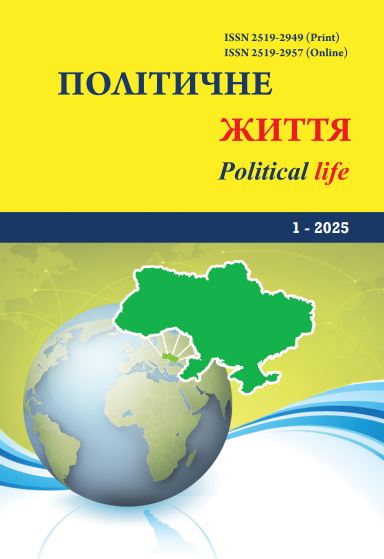Geopolitical dangers of the post-Soviet world order: Z. Brzezinski's assumptions and current trends
DOI:
https://doi.org/10.31558/2519-2949.2025.1.15Keywords:
Z. Brzezinski, I. Wallerstein, S. Huntington, world order, world-system, war, Eurasia, USA, China, RussiaAbstract
The article examines how, in his desire to continue the «American century» in Eurasia, Z. Brzezinski soberly assessed the possible threats to American dominance and the new global shifts. The dilemmas facing the American leadership are significantly complicated by the very nature of the current world situation: the direct and global use of military force is now becoming an extremely risky business, as evidenced by the bloody experience of the Russian-Ukrainian war. The last limiter here is nuclear weapons. An additional limiter is the economic interdependence of states, which continues even in times of military clashes. This makes the use of economic blackmail for political purposes unlikely to be successful. The subjects of the «sanctions strategy» who strike at the «object of economic sanctions» also suffer considerable losses. Comparing the geopolitical approach of Z. Brzezinski, especially expressed in his work «Strategic View» with the approach of I. Wallerstein, which is based on the principles of world-system analysis, and with the civilizational approach of S. Huntington, which is most convincingly presented in his work "Clash of Civilizations", we can conclude that despite of these methodologies differences, they all converge at one point - at the point of ascertaining a fundamental change in the world order, the emergence of new trends in world development, the beginning of a phase of acute conflict transformations over a long period of time. This position is also confirmed in the latest studies of a new generation of researchers of the 21st century first quarter. An era of great powers dizzying political «drift» begins with alternating pressing either on the accelerator or on the brakes of military-power policy. A dangerous game of «all against all» begins, the game to become the new «king of the mountain» – a risky multi-turn game... on the verge of foul.
References
Brzezinski Zbigniew (1998). The grand chessboard: American primacy and its geostrategic imperatives. New York: Basic books. 40 p
Brzezinski Zbigniew (2009). The Choice: Global Domination or Global Leadership. Basic Books 239 p.
Brzezinski Zbigniew (2012). Strategic Vision: America and the Crisis of Global Power. Grover Gardner. Basic Books. 24 p.
Demianyk G. (2022). What Is AUUKUS? Australia, UK And US Unveil Defence Alliance To Thwart China. The Guardian. URL: https://www. huffingtonpost.co.uk/entry/auukus national-security-defencesubmarinesnuclear_uk_614263b7e4b01f79194cb179
Fukuyama, Francis (2012). The End of History and the Last Man. Penguin. 448 p.
Huntington Samuel P. (2007). The Clash of Civilizations and the Remaking of World Order. 368 p.
Krepinevich A. (2023). The Big One: Preparing for a Long War With China. Foreign Affairs. URL: https://www.foreignaffairs.com/china/united-states-big-one-krepinevich
Nye Joseph. What caused Russia-Ukraine War. URL: https://www.project-syndicate.org/commentary/whatcaused-russia-ukraine-war-by-joseph-s-nye-2022-10/
PS Commentators’ Predictions for 2024. Project-Syndicate. URL: https://www.project-syndicate.org/onpoint/ps-commentators-predictions-for-2024-by-ps-editors-2023-12?utm_
Schroeder P. (2023) The Real Russian Nuclear Threat.The West Is Worried About the Wrong Escalation Risks. Foreign Affairs. URL: https://www.foreignaffairs.com/ukraine/real-russian-nuclear-threat
Tarnas R. (1993). The Passion of the Western Mind : Understanding the Ideas That Have Shaped Our World View. Ballantine Books; Reprint edition 560 p.
Toffler, Alvin (1981). The Third Wave: The Classic Study of Tomorrow. 537 p.
Wallerstein I (1996). The inter-state structure of the modern world-system. International theory: positivism and beyond /Eds. by S. Smith, K. Booth, M. Zalewski Cambridge: Cambridge University Press. pp. 87–107.
Wallerstein I. (1989). The Modern World-System. Vol. III; The Second Great Expansion of the Capitalist World-Economy, 1730-1840s./ San Diego: Academic Press. 390 p.
Wallerstein I (1991). Unthinking Social Science. The Limits of Nineteenth-Century Paradigms. / Cambridge: Polity Press,. 296 p.
Wallerstein, I. (1992). The West, Capitalism, and the Modern World-System. Review. XV, Is. 4. P. 561–619.
Wallerstein I. (2000). The Essential Wallerstein / New York: The New Press, 2000. 471 p.
Zelikow Ph. (2023). The Atrophy of American Statecraft. How to Restore Capacity for an Age of Crisis. Foreign Affairs. URL: https://www.foreignaffairs.com/united-states/atrophy-american-statecraft-zelikow?utm_medium

